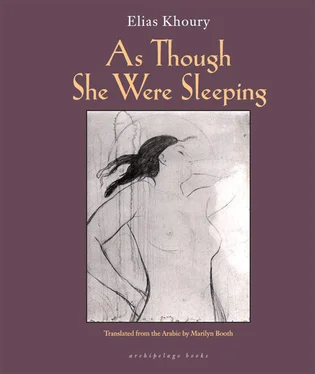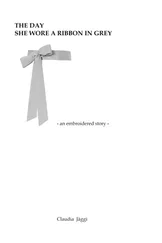Not right now, said Nurse II. Give it a few moments for the drug to work so that the doctor can do what he has to do.
He said he was thirsty. Death makes one thirsty, he said. The bell rope had taken him upward suddenly, he said, and so death came as though a long fainting spell. He saw the fearful sight of Mar Ilyas in his chariot of fire. He wanted to go back to the sons of Zurayq and tell them, All right, fellows, let’s get over it. Let bygones be bygones and let’s go back to being friends.
Nakhleh Shalhoub was alone in the churchyard. He told his wife, Malakeh, he did not see anyone. They all disappeared, he said. On the third day after the burial of his only son he mended things with Abdallah Zurayq and his sons. It was said he received blood money, but he told his wife he hadn’t gotten anything.
And so, the story went, Mitri died strangled by the church bell, the first known death since Bishop Massarra had been successful in obtaining a firman from the Sublime Porte that allowed him to put bells in church courtyards. In the past, congregants had rung hand chimes and large church bells came to be installed only with the intervention of the Russian Consul, who persuaded the Ottoman Governor of Beirut to permit the Greek Orthodox to erect bell towers in their churches. At the time many objected, believing this European practice would distance people from prayer and increase the likelihood that church courtyards would become public playgrounds where boys vied to see who could climb highest and swing widest on the bell rope. But it did not occur to anyone that bell ropes would turn into hangman’s nooses. So Mitri Shalhoub met the countenance of his Lord strangled on a rope that preserved the tolling of the bell in his ears forever.
Young Mitri was at odds with the sons of Zurayq because of a joke. It began in Beirut harbor, where they all worked as porters. Nakhleh worked with his only son; they were carriers for the agency of Khawaja Jirji el-Jahil, a broadcloth importer. Abdallah Zurayq worked with his four sons for the firm of the Sayyid Muhyi ed-Din ed-Daouq, which specialized in wood imports. The game began with an insult — and everyone knows that Beirut folks are consummate artists when it comes to insults and oaths, to the point where such expressions percolate through every category of conversation and discourse. Beirutis make love with insults, express dislike with curses, become friends and turn into enemies with oaths. And it all means that insults carry no particular meaning. A listener must deduce meanings from the speaker’s manner of expression and tone.
The insult that ended Mitri’s life was both original and obscure. Samih, Abdallah Zurayq’s eldest son, said it as he was carrying a very large and heavy wooden plank on his back. Walking by, Mitri could see that he was tired and he extended a hand to help out, asking, Cracked your back? But the junior Zurayq screamed at him, Hands off the wood! When Mitri persisted in wanting to help, an insult came shooting out of Samih’s lips that no one had ever heard before. Take your hand off before I send you back inside your mama’s cunt! It seems the lad was delighted with his own on-the-spot curse, for he said it several more times and turned it into a rhythmic chant. Here is where the problem arose. Mitri attacked Samih and began beating him. Samih let the plank slide off his shoulders and instead of defending himself he yelled the insult out so loudly that the workers gathered around the two young men and tried to separate them. Samih would not stop repeating his expression, which crazed Mitri to the point where he said what no one in all of Beirut harbor would ever have dared to say: Get out of here, you son of Laure! May God defend your own mother’s Pharaoh-loving cunt!
Mitri told his father he hadn’t meant anything by it. He had wanted to respond to the insult with an appropriately similar but innovative one. So he had said the unsayable. Despite their manly swagger, and the bold appearance of their father (famous for his long and carefully twisted moustache), the sons of Zurayq were known as the sons of Laure, because Sitt Laure was the real man of the house. And it was said — and God alone knows — that she was a, well, customer of Khawaja Naji Far’awn, the harbor overseer; and that, furthermore, her husband knew about it but shut his ears and eyes to it. Far’awn-loving, appended to the epithet son of Laure, transformed an argument between two boys into an all-out brawl. The five sons of Zurayq were there immediately as if the earth had suddenly parted to reveal them and began to beat everyone in sight. Mitri slipped away, leaving the field of battle to the fighters who soon discovered that he had disappeared. The skirmish broke up but the young men and boys of the quarter heard the Zurayq sons say they would find Mitri and indeed send him back into his mother’s cunt.
Mitri was terror stricken. According to Sitt Malakeh, the young man slept for three nights running in the house. He abandoned his tree house and did not show up for work in the harbor. On the fourth morning his father came in to reassure him that everything was resolved. He said he had talked with Abdallah Zurayq and the issue was taken care of and everyone had calmed down. But Mitri was not convinced. He told Malakeh he had seen his own mother in a dream. She had held him close, but he had seen darkness descend and was afraid.
Did he dream about the bell they strangled him with? asked Milia.
No, about his mother, and Lord preserve us, he asked if I could smell his mother’s scent. He told me that his father did not even buy a new mattress when he married me. He pulled a fast one on me, that man. He told me he had bought a new bed but the truth is, he repainted the old one and did not even change the mattress. From that day on I couldn’t sleep. I started getting up in the night and walking through the house like a ghost. Nakhleh thought I couldn’t sleep from grief. A week after the boy died I screamed at my husband. You either get a new bed and change the mattress or I’m going back to my family!
Saadeh would not talk about her dead brother. All she said was that her mother, Malakeh, had borne a lot for his sake. She had stayed in mourning for four years and had decided to do as all bereaved mothers did, staying in black until the end of her life. But her husband ruled against that. It’s not your affair, he told her. He was not your son. He was his mother’s son. Nakhleh forced her to take off her black mourning clothes.
His mother’s son died of strangulation in the end. Samih Zurayq said that he came with his brothers to the churchyard to participate in ringing the bell, and that they had forgotten all about the fight after the apology that Nakhleh Shalhoub offered the Zurayq family on behalf of his son. But no sooner did Mitri see them — and he was already clinging on to the bell rope — than he began to soar upward. They did not understand how he could climb the rope like that, but he went up and up, while the bell pealed as no one had ever heard it ring before. Samih said they saw that boy fly and they did not take in what was happening until the sound of the bell began to deaden and grow faint. When they saw Mitri hanging by his neck and flopping around like a just-slaughtered bird, Samih said they grabbed on to the rope to rescue him but when they reached him it was too late because his neck had already stretched thinner than the rope, and the face at the end of it was bright blue. Nakhleh was not exactly convinced by what they said but there was nothing he could do about it. Starting a war with the sons of Zurayq would mean certain death for him, and revenge would not bring back the boy who had been sent back into his mother’s womb, just as they had predicted.
Do you mean that when people die they go back to their mother’s womb? Milia asked Grandmama Malakeh.
Читать дальше












